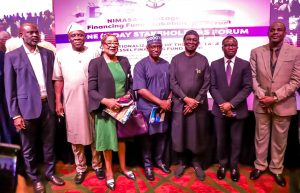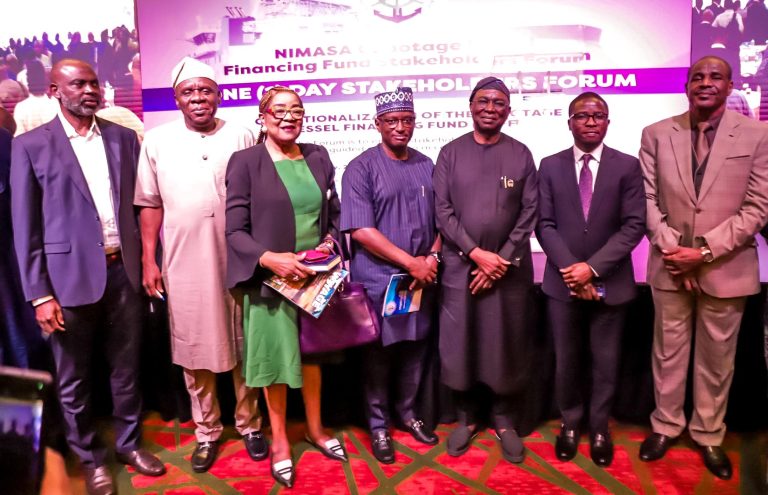…As CSOs want Buhari’s assent to act, to curb $15bn Illicit loss***
The Executive Secretary, Nigerian Content Development and Monitoring Board (NCDMB), Mr Simbi Wabote has warned that the Board will soon begin to blacklist firms that consistently defaulted in the remittance of one per cent deduction on every contract awarded.
He indicated this during a four-day Nigerian Oil and Gas (NOG) Conference in Abuja, with the theme: ‘‘Promoting Investment and Collaboration in Nigeria’s Oil and Gas Industry”, attracting about 2,500 participants and 40 exhibitors.
NCDF is one per cent of every contract awarded to any contractor, sub-contractor, alliance partner or any other entity involved in any project, operation activity or transaction in the upstream sector of the Nigerian Oil and Gas Indus try.
The money will be deducted at source and paid into the NCDF account.
Wabote said it was worrisome that some oil and gas firms had consistently defaulted in the remittance of the one per cent deduction.
He said that such companies should be ready to face the full wrath of the law.
“As a further step to blacklisting the defaulting oil companies, in order to serve as a deterrent to others, the Board is carrying out a forensic audit to determine the actual number of defaulters.
“It will determine how much is being owed, and how much they are expected to have paid, and the report will be forwarded to the Economic and Financial Crimes Commission (EFFC) for possible prosecution and debts recovery.
‘‘You cannot believe it that some companies, including International Oil Companies (IOCs), indigenous firms, contractors and operators are not paying these funds.
“We are getting close to where we will hand them over to the relevant prosecuting agencies.
“To enhance accessibility to the fund, the Board in July 2016, signed a Memorandum of Understanding (MoU) with the Bank of Industry (Bol) to establish the NCIF,” he said.
Wabote said the Nigerian Content Intervention Fund (NCIF) provides long term facilities to contributors to NCDF on the basis of all-in eight per cent interest rate.
“The NCIF is a component of the NCDF to meet the funding needs of indigenous manufacturers, service providers and other key players in the Nigerian oil and gas industry,” he said.
Wabote also said that Nigerian companies have so far accessed 160 million dollars out of the 200 million dollars NCDF to build capacity.
He said the 200 million dollars NCDF domiciled with the Bol had been a very successful scheme with only 40 million dollars left.
According to him, the fund has helped the agency to support investment in collaborating with Bol and other stakeholders with the roll out of the 200 million dollars NCIF.
He also said that the fund had helped to establish modular refineries, while the board had been able to exit appropriation to become a self-funding agency of government.
‘‘When I took on this responsibility, I discovered that NCDMB was getting one per cent deduction from oil and gas contracts from operators.
“But it was still relying on the Federal Government for appropriation, and I felt something was not right and I said we cannot work that way.
“So, in line with the former Minister of State for Petroleum Resources’ mandate that all agencies must be self-funding, we decided to key into that vision.
“By 2018, we exited appropriation. At the moment, they don’t discuss appropriation for NCDMB in the National Assembly.
“We only go through the approval process with the Federal Government and the National Assembly for whatever money we need to spend.
“So, if we are self sustaining, we must go out there to recover to the last penny, all monies owed the board, otherwise, we may get to a point where we will not be able to pay our salaries or carry out our mandate as a regulator,” Wabote added.
Meanwhile, a coalition of 11 Civil Society Organisations (CSOs) have urged President Muhammadu Buhari to assent to the Companies and Allied Matters Act (CAMA) to curb 15.7 billion dollars annual loss illicit financial flows.
The CSOs include Civil Society Legislative Advocacy Centre (CISLAC) Zero Corruption Coalition, CITAD, Centre LSD, Open Alliance Budget, Centre For Democracy and Development among others.
Mr Auwal Rafsanjani, Convener of the CSOs at a news conference on Monday in Abuja, said that the bill, which was passed by the 8th National Assembly, was now before the president.
Rafsanjani said that the 15.7 billion dollars annual loss was revealed by the Global Financial Integrity Report.
“If signed into law by president Buhari, it will lead to the establishment of the electronic web-based open beneficial ownership register in Nigeria.
“The ultimate goal is the establishment of comprehensive database of the real owners behind the management of private companies operating within Nigeria’s jurisdiction.
“ If CAMA bill is not signed by president Buhari this week, a decade of work will be lost and irreparable diplomatic, economic and reputational damage would be inflicted on Nigeria.’’
Rafsanjani said that Buhari made commitment to strengthen anti-corruption reforms and had joined the Open Government Partnership (OGP) in May 2016, during the Anti-corruption Summit in London, in a bid to deepen institutional and policy reforms.
According to him, one of those commitments is that Nigeria will establish a public central register of companies to know who owns what in Nigeria.
He said that three years after the bold commitment and two years of implementation of OGP, there was still no beneficial ownership register and a legal law to that effect.
He said that the beneficial ownership register would address issues of Financial Action Task Force (FATF) aimed at promoting policies that insulate global financial systems from acts of money laundering.
Rafsanjani said it would also curb financing of terrorism, while also profiting all Nigerians because stolen public wealth would be exposed.
He said that the damning implications of not signing the law included Nigeria risking suspension from the Global Extractive Industry Initiative (EITI) among other sanctions.
He added that Nigeria’s failure to enact the Proceeds of Crime Act (POCA) had jeopardised assets recovery efforts as hundreds of U.S. dollars were waiting to be returned to Nigeria by the international community.
“Let us be crystal clear, concealing of beneficial owners cost lives of our fellow countrymen as terrorists use international financial systems to sustain their operations.
“Without transparent ownership of local and international companies operating in Nigeria, we will not be able to stop the bleeding from illicit financial outflows.’’
Rafsanjani said as long as wrong incentives and dysfunctional supervision dominated Nigeria’s national financial systems, there would be consequences such as terrorism financing, trans-national organised crime, tax evasion and illegal enrichment of politically exposed persons.
He said that CAMA and beneficial ownership register were one of the indispensable mechanisms that had a potential to make a real difference in the anti-corruption war.


















